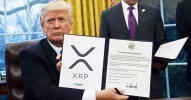Based on the latest developments, the U.S. Securities and Exchange Commission (SEC) has reportedly abandoned its appeal in the lawsuit against Ripple, as announced by Ripple CEO Brad Garlinghouse on March 19, 2025. This follows a significant ruling on July 13, 2023, by U.S. District Judge Analisa Torres, who determined that XRP is not a security when sold to the public on exchanges, though she ruled that Ripple’s direct sales to institutional investors did constitute an unregistered securities offering. With the SEC dropping its appeal, the 2023 ruling stands as the prevailing legal interpretation in this case.
The decision that XRP itself is not a security, particularly in programmatic sales to retail investors via exchanges, has been a key outcome of this legal battle. This distinction hinges on the application of the Howey Test, which defines a security as an investment of money in a common enterprise with an expectation of profit derived primarily from the efforts of others. The court found that retail buyers on exchanges did not have a reasonable expectation of profit tied directly to Ripple’s efforts, thus excluding those transactions from being classified as securities. However, institutional sales were treated differently due to the nature of the transactions and Ripple’s marketing to those buyers.
With the SEC no longer pursuing an appeal, there is no current legal challenge from the agency to overturn the ruling that XRP is not a security in the context of public exchange sales. This effectively solidifies XRP’s status as not being a security under U.S. law based on the standing court decision, at least until any new legal or regulatory actions arise. That said, the broader regulatory landscape for cryptocurrencies remains fluid, and future interpretations or actions by the SEC or other authorities could still impact XRP’s classification. For now, though, the resolution of this case points to XRP not being considered a security in the eyes of the U.S. judicial system.


